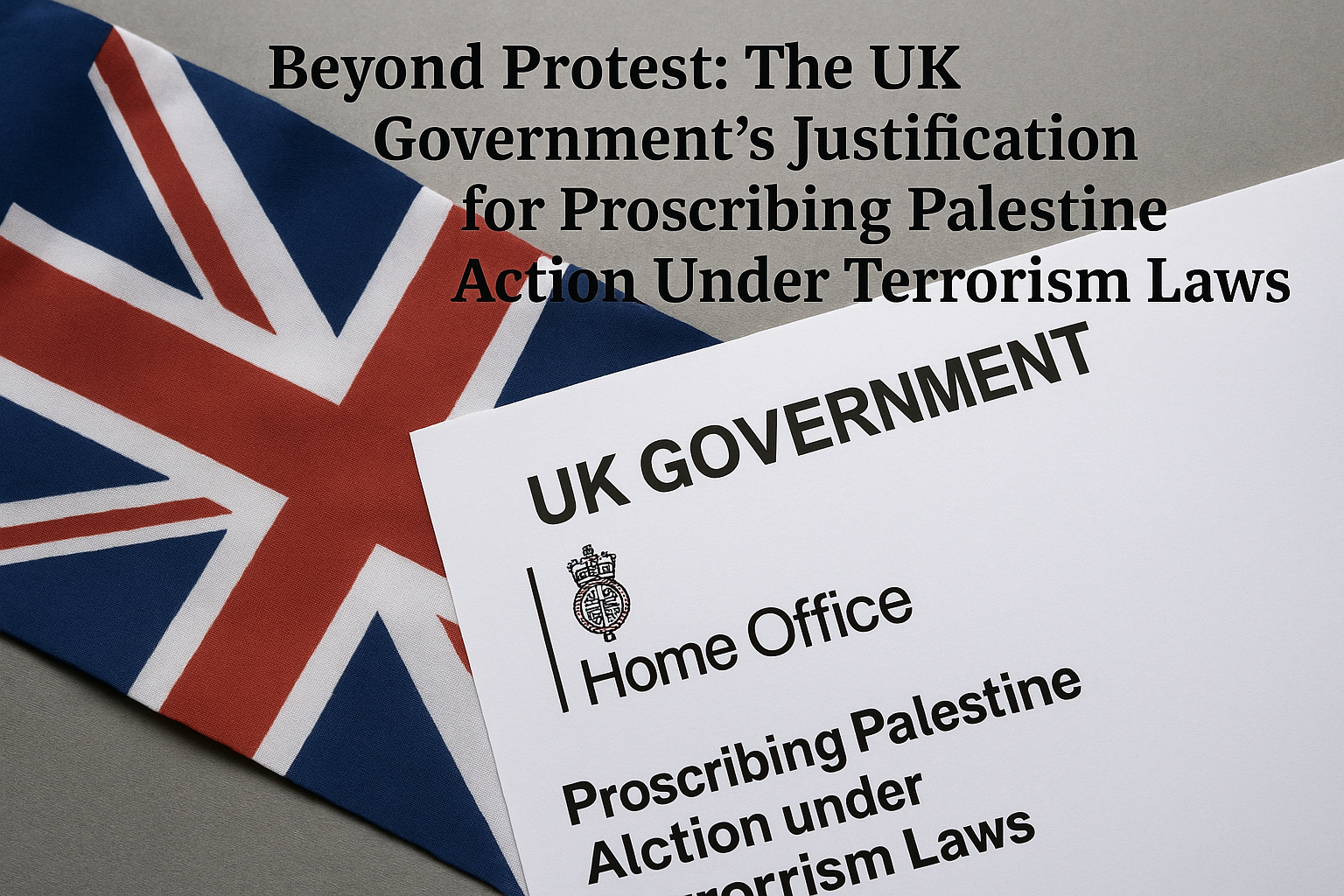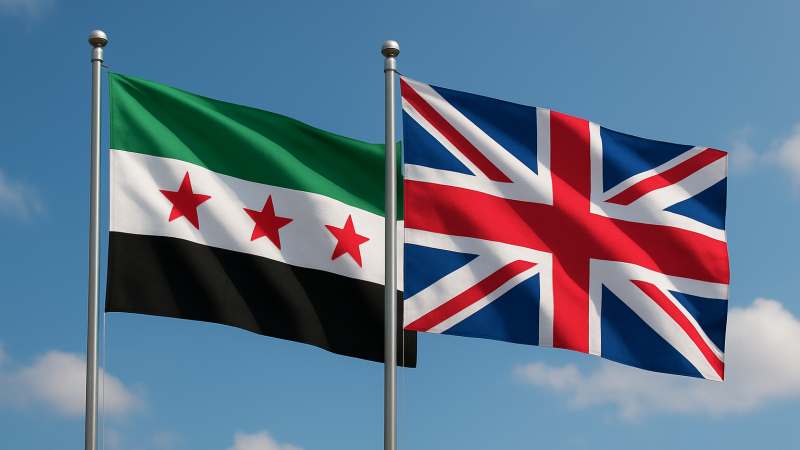Beyond Protest: The UK Government’s Justification for Proscribing Palestine Action Under Terrorism Laws

The UK government’s decision to proscribe Palestine Action as a terrorist organization is a significant move, rooted in the Terrorism Act 2000 and driven by concerns over the group’s tactics, impact on national security, and alleged intent to influence government policy through serious criminal damage. This proscription, which came into effect recently, criminalizes membership of, and support for, Palestine Action, carrying potential prison sentences of up to 14 years.
To understand the government’s rationale, it’s crucial to examine the legal framework, the specific activities of Palestine Action, and the broader policy considerations that inform such a severe measure.
The Legal Basis: Terrorism Act 2000 and Its Application
The cornerstone of the UK’s counter-terrorism legislation is the Terrorism Act 2000 (TA 2000). This Act grants the Home Secretary the power to proscribe an organization if they “reasonably believe that it is concerned in terrorism.” The definition of “terrorism” under Section 1 of the TA 2000 is expansive and central to this proscription. It defines terrorism as:
“The use or threat of action designed to influence the government or an international governmental organisation, or to intimidate the public or a section of the public, for the purpose of advancing a political, religious, racial or ideological cause.”
Crucially, the “action” itself must involve one or more of the following:
- Serious violence against a person
- Serious damage to property
- Endangering a person’s life (other than that of the person committing the action)
- Creating a serious risk to the health or safety of the public or a section of the public
- Action designed seriously to interfere with or seriously to disrupt an electronic system
An organisation is deemed “concerned in terrorism” if it:
- Commits or participates in acts of terrorism
- Prepares for terrorism
- Promotes or encourages terrorism (including the unlawful glorification of terrorism)
- Is otherwise concerned in terrorism
The Home Secretary also considers a range of other factors when deciding on proscription, including:
- The nature and scale of the organisation’s activities.
- The specific threat it poses to the UK.
- The specific threat it poses to British nationals overseas.
- The extent of the organisation’s presence in the UK.
- The need to support other members of the international community in the global fight against terrorism.
The government’s argument for proscribing Palestine Action hinges significantly on the “serious damage to property” limb of the definition and the intent to “influence the government” or “intimidate the public.”
Palestine Action’s Modus Operandi and the “Terrorism” Threshold
Palestine Action emerged in 2020 as a direct action network focused on disrupting and ending what it identifies as UK complicity in the Israeli military-industrial complex, particularly targeting firms like Elbit Systems, an Israeli defence electronics company with a significant presence in the UK. The group openly advocates for and conducts “direct action” protests, which frequently involve criminal damage.
1. Systematic and Serious Damage to Property: The core of the government’s case lies in the repeated and deliberate acts of extensive property damage. Palestine Action has engaged in:
- Vandalism and Defacement: Their signature tactic involves spray-painting buildings, machinery, and vehicles, often with red paint symbolizing blood. This extends to sensitive national infrastructure. A prominent recent example is the incident at RAF Brize Norton, where activists allegedly spray-painted and damaged two Voyager aircraft using red paint and crowbars. This incident alone is reported to have caused around £7 million in damages and has significant implications for the UK’s military operational readiness, as these planes are used for air-to-air refuelling and support missions, including those in the Middle East.
- Occupations and Disruptions: Activists have repeatedly occupied factories, offices, and other premises linked to defence contractors. These occupations, sometimes lasting for days, disrupt business operations, lead to significant economic losses for the targeted companies, and often necessitate costly clean-up and security measures. For instance, sustained pressure against an Elbit factory in Oldham reportedly led to its closure in January 2022, which Palestine Action heralded as a victory. Similarly, a factory in Tamworth manufacturing parts for Israeli tanks was reportedly forced to sell.
- Targeting Critical Infrastructure: The group’ has broadened its targets beyond just Israeli defence firms to include financial institutions, universities, and even government buildings. The Home Secretary highlighted that Palestine Action has targeted “key national infrastructure and defence firms that provide services and supplies to support Ukraine, NATO, ‘Five Eyes’ allies and the UK defence enterprise.” Damage to a Thales UK factory in Glasgow in 2022, for example, caused over £1 million in damage, including to parts essential for submarines, directly impacting the UK’s defence capabilities.
The government argues that the scale, frequency, and deliberateness of this damage, alongside the financial and operational impact on legitimate businesses and national infrastructure, clearly meet the “serious damage to property” criterion of the TA 2000. It is not merely petty vandalism but calculated destruction intended to achieve political aims.
2. Intent to Influence Government and Intimidate: Beyond the damage itself, the intent behind the actions is critical for the “terrorism” definition. The government asserts that Palestine Action’s activities are “designed to influence the government” and “intimidate the public or a section of the public” for a political cause.
- Influencing Government Policy: Palestine Action’s stated aim is to compel the UK government to cease its arms trade and military cooperation with Israel. By disrupting the operations of defence companies and impacting supply chains that serve the UK armed forces and its allies, the group aims to create sufficient pressure to force a change in government policy. The interference with military assets, such as the RAF Brize Norton incident, directly targets the state’s ability to conduct its defence and foreign policy, thereby seeking to influence it through coercive means.
- Intimidation of Public or Industry: While Palestine Action frames its actions as non-violent, the government argues that the aggressive nature of their tactics, including direct confrontations, occupations, and the use of pyrotechnics and smoke bombs in evacuation areas (as observed in some protests, causing staff to flee for safety), can be interpreted as intimidating. The consistent targeting and harassment of employees and businesses can also be seen as an attempt to intimidate a section of the public (i.e., those involved in or associated with the targeted industries) into ceasing their activities. The group’s public communications celebrating their “victories” against companies contribute to this perceived atmosphere of intimidation, aiming to deter others from engaging with the targeted sector.
3. Preparing for and Promoting Terrorism: The government also points to how Palestine Action operates and disseminates information.
- “The Underground Manual”: Official government statements and parliamentary debates have referenced a document titled “The Underground Manual,” reportedly disseminated by Palestine Action. This manual is said to offer guidance on forming “cells,” conducting actions against private companies and government buildings, and includes advice on operational security to evade law enforcement. Such a document is presented as clear evidence that the group is “preparing for terrorism” by providing instructions and facilitating the commission of further acts of serious property damage.
- Online Presence and Glorification: Palestine Action maintains a robust online presence across various platforms, where it publishes videos and images of its direct actions, celebrates successes, and calls for further participation. The government argues that this public glorification of acts involving criminal damage and disruption, particularly when framed as successful means to achieve political ends, constitutes “promoting or encouraging terrorism.” This online activity is also crucial for galvanizing support, recruiting new members, and raising funds, making it an integral part of their operational capacity.
Broader Policy Considerations and Justifications
The decision to proscribe goes beyond simply meeting the legal definition; it involves a policy judgment about the threat posed and the necessity of such a measure.
- Escalation of Threat: The Home Secretary and security services have assessed that Palestine Action’s activities have been escalating in frequency, severity, and breadth of targets. The group’s nationwide footprint, covering all 45 policing regions in the UK, and its stated intention to intensify its campaign, necessitate a more robust response.
- Resource Drain on Law Enforcement: The continuous and disruptive nature of Palestine Action’s protests places a significant strain on police resources across the country. Officers are diverted from other duties to manage protests, investigate incidents, and process arrests, incurring substantial costs for the taxpayer.
- Protection of National Security and Economic Interests: Attacks on defence supply chains and critical infrastructure are not merely acts of vandalism; they can have direct implications for national security. Disrupting companies that contribute to the UK’s defence capabilities, including those supporting international alliances like NATO and operations in Ukraine, is seen as directly undermining the country’s strategic interests. The economic cost to businesses, running into millions of pounds, further justifies intervention.
- Clear Red Line for Protest: The proscription sends an unequivocal message that while the right to peaceful protest is protected in the UK, actions involving serious criminal damage, intimidation, and an intent to coerce government policy through such means will be treated as terrorism. The government asserts that this measure is “ideologically neutral,” focusing solely on the nature of the actions rather than the political cause. It aims to distinguish legitimate protest from criminal activity that crosses the threshold into terrorism.
- Disruption and Deterrence: Proscription provides law enforcement with powerful tools to dismantle the organisation. Membership becomes a criminal offense, facilitating arrests and prosecutions. Assets can be frozen, and the ability to raise funds or organize meetings is severely curtailed. This aims to disrupt the group’s operational capacity and deter individuals from participating in or supporting its activities. The maximum penalty of 14 years’ imprisonment for proscription offenses serves as a significant deterrent.
- International Cooperation: The UK actively participates in international efforts to combat terrorism. Proscribing organisations that meet the domestic legal threshold reinforces the UK’s commitment to these global efforts and maintains consistency in its approach to various forms of ideologically motivated violence or disruption.
Conclusion
The UK government’s proscription of Palestine Action is a measured response based on a rigorous assessment that the group’s activities fulfil the criteria for being “concerned in terrorism” under the Terrorism Act 2000. The systematic perpetration of serious property damage, coupled with a clear intent to influence government policy and intimidate sections of the public, forms the bedrock of this decision. While Palestine Action may characterize its actions as legitimate protest, the government views them as crossing a critical threshold into coercive and disruptive criminal acts that undermine national security and public order. The proscription aims to provide law enforcement with the necessary powers to effectively counter these activities, deter future occurrences, and reinforce the distinction between lawful demonstration and actions deemed to be terrorism.






